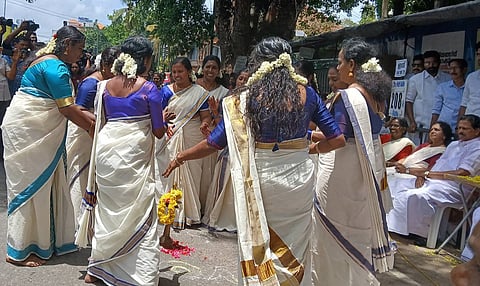

Today, on September 5, Kerala is celebrating Thiruvonam. Families have gathered around banana leaves piled with rice, curries, pickles, and sweets—the annual Onasadhya feast that commemorates a mythical past of equality and justice. But in front of the Secretariat in Thiruvananthapuram, a very different feast has unfolded. Hundreds of Accredited Social Health Activists—ASHAs—are sitting on the pavement, eating a modest meal, and calling it their Onam lunch. For them, it marks not a celebration, but the 209th day of an indefinite strike.
These women are not outsiders to Kerala’s celebrated welfare model. They are its invisible foundation. Since 2006, ASHAs have been the first point of contact for healthcare in villages, tribal settlements, and urban neighbourhoods. They escort pregnant women to hospitals, monitor blood pressure and sugar levels in households, ensure child immunisations, accompany TB patients for treatment, and spread awareness about hygiene and nutrition. During the COVID-19 pandemic, when the world applauded Kerala’s “model” response, it was the ASHAs who went door to door, persuading the reluctant, testing the sick, and ensuring quarantine rules were followed. They were hailed as warriors then. Today, they are branded “volunteers,” denied even the right to a living wage.
“Our job never ends,” says Sindhu from Idukki. “The phone rings at midnight when someone needs an ambulance. We rush to homes at dawn when a mother goes into labour. But when it comes to paying us, the government looks away.”
At present, each ASHA in Kerala gets a monthly honorarium of Rs 7,000 from the state, supplemented by irregular central and state incentives. On average, most earn less than Rs 9,000 a month—barely enough to feed a family in one of India’s most expensive states. To make matters worse, deductions are routine. Miss a meeting because of illness or a family emergency, and the month’s earnings shrink. Many women spend out of their own pockets on bus fares, phone bills, and stationery. The work demands full-time commitment, but the pay does not even qualify as minimum wage.
The cruelty of contrast is hard to miss this Onam. The Kerala government recently spent Rs 20,000 crore to clear pending arrears of pensions, dearness allowance, and welfare schemes. Government employees and pensioners received their dues and festival allowances. Even casual workers under different boards got payments released. Only the ASHAs were excluded. Their token festival allowance was Rs 1,450—barely enough to buy a new dress for a child. “Is this the value of our labour?” asks Shakunthala from Thrissur. “When others celebrate, we are left with shame.”
Onam, the festival of abundance, equality, and empathy, has turned into a mirror of exclusion. For ASHAs, the mythical return of King Mahabali—who is said to visit Kerala each year to see if all are treated equally—carries bitter irony. “If Mahabali comes tomorrow, will he find equality here?” asks Padma, a 56-year-old ASHA from Malayinkeezhu. “We sit on the road, while others eat feasts at home.”
Under pressure, the government appointed a five-member committee headed by Women and Child Development Director Haritha V Kumar. The committee, after months of delay, submitted its report recommending a Rs 3,000 hike in honorarium and a Rs 1 lakh retirement benefit. For the women, it was welcome recognition but fell far short of reality. “Recommendations are not food on our plates,” says M A Bindu, general secretary of the Kerala ASHA Health Workers Association. “Until the government issues an order and implements it, we will not move from the streets.”
The High Court itself had to intervene earlier this year, prodding the government to act after months of inaction. Yet, Chief Minister Pinarayi Vijayan has remained conspicuously silent. Health Minister Veena George insists the state cannot bear the financial burden and accuses the Centre of neglecting its responsibilities. The CPI (M)-affiliated ASHA federation goes further, alleging the strike is politically motivated. The women find such accusations deeply wounding. “This is not politics. This is hunger,” says Mini S, a protest leader from Kollam. “Our children cannot go to school on promises. Our families cannot eat recommendations.”
The irony of Kerala’s self-image as a progressive welfare state runs through the protest. Globally, India has committed to recognising health as a fundamental human right under the United Nations’ International Covenant on Economic, Social and Cultural Rights. It has pledged to uphold gender equality and decent work standards under the Convention on the Elimination of All Forms of Discrimination Against Women (CEDAW) and the ILO conventions on fair wages. By underpaying ASHAs, denying them social security, and dismissing their labour as “voluntary,” Kerala violates not only domestic principles of justice but also international commitments.
“This is not just about wages,” says activist and writer K Satchidanandan, who has stood with the women. “It is about dignity, empathy, and the recognition of care work. A welfare model that exploits women’s unpaid or underpaid labour is a betrayal of its own ideals.”
What makes the strike remarkable is the solidarity on the ground. Since February 10, the pavement outside the Secretariat has transformed into a parallel village. Women sleep under tarpaulin, share food and medicines, and console each other when despair hits. Civil society groups, opposition leaders, and human rights activists make regular visits. Even Priyanka Gandhi Vadra, during a visit to Wayanad, called ASHAs “the true backbone of public health.” Yet, despite the attention, the government’s coldness persists.
Today, as Kerala’s households prepare for their grand feasts, these women will eat their simple Onasadhya on the pavement. Rice, a curry or two, and perhaps a sweet dish sent by sympathisers. But each plantain leaf will carry a message: we are here, we are fighting, we will not vanish into silence.